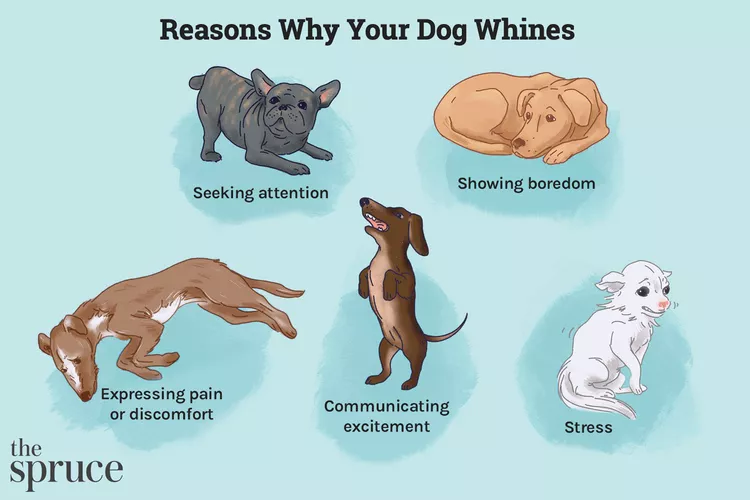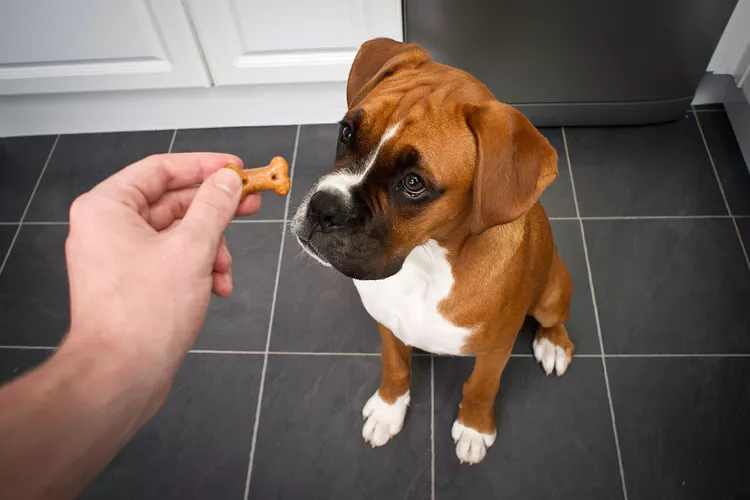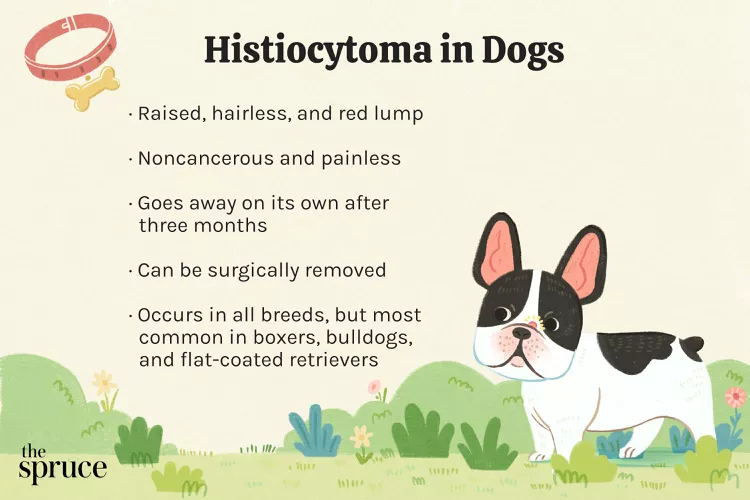
While it may seem like your dog is whining for no reason, he is trying to tell you something. Like barking and growling, whining is a way for dogs to vocalize their desires, excitement, pain, stress, and everything in between. The question of whether or not you should respond to a whining dog depends on the underlying reason. Rewarding the whining by giving your pup treats or attention could encourage the whining, resulting in a pup that whines excessively. There are a few things you can do to interpret the whining, calm the dog, and maybe even stop the behavior.
Whining is especially common in puppies because they're learning how to communicate their needs and wants. Young puppies whine to get attention and food from their mother in the same way that babies cry.
It’s often fairly obvious why a dog is whining. It may be begging for a treat from your plate or asking to be let in or out of the house. At other times, the whining may not be so easy to decipher. In these instances, look at the body language that accompanies the dog whining to figure it out. There are a few common reasons why dogs whine, although they may sometimes overlap.
If your dog wants something from you, like a walk, food, or a toy, it may whine in an effort to tell you. You may even notice its eyes shifting between you and the door or other desired object while it's whining.
Attention-seeking whining may occur if you're doing something that doesn't involve your dog, like having a phone conversation with someone or focusing on an important task. It may also happen when your dog becomes jealous of the time you're spending with another person or pet.
If your dog is excited, whining may be part of its way of burning energy and may be accompanied by jumping up and down and running around. Part of this type of whining may also be about seeking attention.
Boredom whining often comes across as a "woe is me" sigh-and-whine combo. The dog whines out of boredom and may also be trying to get your attention.
Many dogs whine if they're sick or in pain. If your dog isn't feeling well, whining may be its way of getting your attention to let you know. In some cases, the whining could be an effort on the dog's part to calm itself down rather than to get attention.
If your dog is whining a lot and you've eliminated other reasons, a visit to the vet is in order to rule out medical issues before you dismiss the whining as a behavior problem.
It's common for a dog to whine when it's anxious or afraid. This type of whining is often accompanied by appeasement gestures, like yawning, lip licking, or averting the eyes. You may also notice a whine and yawn occurring together.
By displaying appeasement gestures, the dog is trying to calm itself down and send a signal to others that it's not a threat. Whining due to stress is often accompanied by other signs of fear such as cowering, flattened ears, and a tucked tail.
If your dog is whining excessively, it's best to try and learn the reason before you try to address the behavior. Some people don't mind a little whining now and then, whereas others can barely tolerate it and consider any amount of whining to be excessive and annoying. The good news is that you can train your dog to whine less—or perhaps not to whine at all.
In most cases, you can manage excessive whining with basic training, mental stimulation, and exercise. When the behavior is seriously resistant to change, you may need to bring in a trainer or behaviorist for extra help. Be patient and consistent no matter what, though, and you're more likely to see your desired results. You may not be able to completely rid your dog of the habit of whining, but you should at least be able to decrease it to a more tolerable level.

Cute Pictures & Facts About Calico Cats & Kittens
Learn fascinating facts about calico cats, including photos, the genetics behind this color combination, and common folklore and traditions.
How to Prevent Cat Separation Anxiety During Vacations
Discover why cats develop litter box problems and cat behavior problems when you go on vacation and what you can do about it to help them.
Cat Behavior Changes That Might Mean Something's Wrong
Cats' behavioral changes may indicate problems—or they may mean nothing at all. Explore causes of odd behavior and what to do about them.
Lhasa Apso: Dog Breed Characteristics & Care
The Lhasa apso is an ancient breed from Tibet that was bred to be a watchdog. Learn about its history, health, exercise needs, and more.
Reasons Why Dogs Run Away and How to Stop It
Dogs can escape, especially if they’re bored and not properly contained. Here are some techniques for stopping your dog from running away.
Can Dogs Get Depression? How to Help Your Sad Dog
Can dogs get depression? Learn about the signs of depression in dogs and find out how to help your sad dog.
How to Stop Aggression in Dogs
Dog aggression can be a serious behavior issue for pet owners. Learn how to stop aggression in dogs before someone gets hurt.
How to Stop Your Dog From Growling
A growling dog can soon become even more aggressive. Reduce the noise and potential for a dangerous situation with some of these techniques.
Why Do Dogs Dig Holes? How to Stop Your Dog from Relandscaping Your Yard
Dogs have been digging holes for centuries and for many reasons. Whether they’re bored or want to cool off in the dirt, here are the top reasons why dogs dig holes.
Dog Treat Varieties
Learn about the different types of dog treats on the market and decide which are best for your dog.
Can Dogs Eat Asparagus?
Dogs can eat asparagus, provided the vegetable is cooked plain and cut up for them. Seasonings, salt, and butter make it unhealthy for dogs.
Histiocytomas in Dogs
A histiocytoma is a type of benign (non-cancerous) skin lump that usually affects young dogs. Learn the causes, treatment, and prevention.
Why Is My Dog’s Eye Swollen?
If your dog's eye is swollen, she may need veterinary attention. The inflammation could be caused by allergies, an injury, or even a tumor.
Common Bugs and Parasites Found on and Inside Dogs
Learn about common types of parasites in dogs. Find out how to treat and prevent parasites to keep your dog, your family, and yourself safe.
Exploring the Different Types of Pet-Friendly Beaches
Are you looking for pet-friendly beaches? Learn about the different types of pet-friendly beaches, their locations, and tips for visiting them with your pet.
10 Obscure, Little-known Canine Facts in Honor of National Dog Day
With National Dog Day upon us, it's time to celebrate everything about our favorite pets—even the weirder stuff. Here are 10 obscure facts about dogs you probably didn't know.
Kitten Development From 3 to 6 Months Old
Kittens grow and change a lot during their first year. Find out what happens between the ages of three months and six months old.
95 Siamese Cat Names
Our list of Siamese cat names has diverse and fun options to help you choose the ideal moniker for your elegant and lovable feline companion.
What to Buy for Your New Cat: A List of Essentials
Before you bring your new cat or kitten home, there are a number of things to collect or buy so your cat will feel welcomed like a family member.
The 6 Best Cat Nail Clippers of 2024 for a Safe Trim
Clipping your cat's nails can save your furniture and keep your kitty comfortable. We asked veterinarians for their cat nail clipper recommendations.